
Russell Moore
New Haven Farms will expand its incubator farm program this growing season to include locations in the Fair Haven and Hill neighborhoods, bringing an additional 25 families to the project.
This change comes with growing demand for the program, which provides local families with 4-by-8 foot garden beds to grow food for their homes. More participants from New Haven Farms’ farm-based wellness program, who are recommended to the program by health care professionals, will be able to transition into gardening after completing the program, through a collaboration between New Haven Farms and the New Haven Land Trust. The new garden locations will be located in separate neighborhoods, at Davenport Avenue and Stevens Street, to serve a larger portion of the New Haven area. The program is partially funded by the Harvard Pilgrim Health Care Foundation.
“The incubator gardener program grew out of requests from our participants in the farm-based wellness program that they wanted to be more knowledgeable and to have the opportunity to grow their own food after having the benefit of having access to fresh organic produce for a whole summer,” Russell Moore, the executive director of New Haven Farms, told the news. “They were really looking for ways to stay connected to New Haven Farms and to deepen their understanding of gardening and making positive lifestyle choices.”
Families are eligible for participation in the incubator gardens after they complete the farm-based wellness program, which is a summer program that incorporates cooking class, nutrition workshops and gardening lessons to improve nutrition in families. They are provided with fresh produce from New Haven Farms and new recipes to use for the summer and can later become participants in the farming through the incubator program. Families become eligible for the farm-based wellness program after a family member is recommended to the program by a medical professional because of diet-related chronic disease risk factors.
The expansion of the incubator program was partially motivated by the expansion of the wellness program into the Hill neighborhood, according to Esther Rose-Wilen, the garden education coordinator at the New Haven Land Trust. The Land Trust wanted to give more people the opportunity to continue to lead a healthy lifestyle after the program, Rose-Wilen explained.
The program has been successful in improving people’s overall health, according to Moore. Several people have been able to go off of medication because of the dietary changes they have made as a result of the program.
“The incubator gardener program is just a further evolution of the model where people have the responsibility to take control over what food they feed their families and how they use nutritious food to improve their health,” Moore said. “That’s the next step in terms of their transition from patient to producer.”
According to Rose-Wilen, the expansion of the program will incorporate a new mentorship program that will connect gardeners at the original site to those at the two new sites so that the veteran gardeners can share their knowledge. She said that she hopes the program will also be able to plan more potlucks, where families bring dishes made with their produce to share together. They will also have more frequent nutrition workshops at each of the farm sites.
Rose-Wilen and Moore both emphasized the importance of community to the gardeners in the program.
“One of the benefits of our urban farms is that they really serve as a vehicle to strengthen the social fabric of neighborhoods,” Moore said. “We have volunteers from the neighborhoods that help us on the farms, and we provide them free produce if they are consistent volunteers.”
Moore added that the farms now produce a combined 18,000 pounds of produce.
As the program expands, Rose-Wilen expects that the community will only grow stronger. Other gardeners from the new locations will visit their English Street locations for workshop, which she said will help bonds to grow for the different gardening sites.
The organizations are also planning a trip to the Northeast Organic Farming Association conference in March, where they will be able to learn more about other urban farming initiatives in Connecticut and meet other farmers in the area.
“Food access is an environmental and health issue, but also in terms of climate change resilience, there are infinite things you could say about community agriculture,” Rose-Wilen said. “From an environmental perspective it’s super powerful, but from a health perspective it is also so powerful.”
The incubator farms program began in 2015.
Carolyn Sacco | carolyn.sacco@yale.edu







